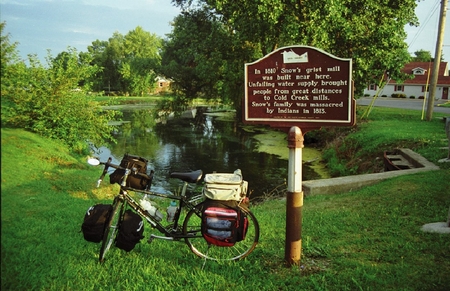
This photo is one of my father’s 35mm slides from 1959. It was deteriorating badly, but I did what I could with it, along with a bunch of others I did for my parents’ 60th wedding anniversary this summer.
So what does it have to do with George Bush and SCHIP? Well, now that the Senate has passed the expansion of SCHIP, the script calls for George Bush to let some of his followers go out on a limb and support his threatened veto, then cut them down and stab them in the back by signing it anyway. Then conservative commentators will be bewildered as to why George Bush would have done such a thing, given that he’s done the same thing every time he’s had an opportunity to do so up to now.
That still doesn’t explain the photo.
I put it here because the problem with SCHIP is not so much that it will be an expensive boondoggle (though it will be that) as that it helps destroy families.
We didn’t have much money when I was growing up, but my parents managed to save enough so we could have one good travel vacation every summer. Dad built the travel trailer shown in the photo, and for a few years had to explain what it was every time we stopped at a gas station. Later pop-up campers became common. This one may look clunky, but you ought to have seen the one we borrowed for a trip to California in 1956. Dad improved on the design, substituting aluminum framework for the steel bedposts used as a tent frame on that one, and using thinner plywood.
In 1959 (the year of this photo) we went to the Canadian Rockies. I remember that Nikita Khruschev’s upcoming visit was in the news, and the idea of it was about as controversial as the recent one by Mahmoud Ahmadinejad. I remember Dad getting into a conversation with someone in Canada, saying maybe it was good that Khruschev would come for talks. It surprised me somewhat to hear him say that. (Now that I think about it some more, I remember it better. Dad did not say that. It was a topic of conversation at more than one campsite, and someone else said it. )
We managed to have money for a vacation every year, but to do that we had to do without other things. For example, I have crooked teeth because my parents couldn’t afford to get them straightened. I’ve always been grateful that they chose to take us on travel vacations instead. There are lots of good memories from those trips.
When I mentioned this a few years ago to my sister (who is in the photo, as am I) she said no parent should have to make such choices. I retorted that who could better make that choice than the parents? Do we want governments making those choices for us?
Resources are limited, and such choices will be made at one place or another.
But the real problem is that if you take away all of those terrifying decisions that parents have to make for their children, they cease to be parents and the children cease to be their children. The family community is replaced by an extreme individualism in which each individual’s relationship is more with the state, and less with the family. And that results in social pathologies such as we see in Great Britain, which is now carelessly throwing away its hard-won advances in human rights in order to deal with it. (Anti-social behaviour orders, anyone?)
Would our government really be breaking up families on purpose in order to replace family relationships with others more to its liking? Of course it would. It wouldn’t be the first time. Listen to James Monroe’s state of the union address in 1818:
Experience has clearly demonstrated that independent savage communities can not long exist within the limits of a civilized population. The progress of the latter has almost invariably terminated in the extinction of the former, especially of the tribes belonging to our portion of this hemisphere, among whom loftiness of sentiment and gallantry in action have been conspicuous. To civilize them, and even to prevent their extinction, it seems to be indispensable that their independence as communities should cease, and that the control of the United States over them should be complete and undisputed. The hunter state will then be more easily abandoned, and recourse will be had to the acquisition and culture of land and to other pursuits tending to dissolve the ties which connect them together as a savage community and to give a new character to every individual. I present this subject to the consideration of Congress on the presumption that it may be found expedient and practicable to adopt some benevolent provisions, having these objects in view, relative to the tribes within our settlements.
He says he wants to break up the community relationships of the Indians so they can be more easily controlled by the government. That’s what was done then, and that’s what’s happening now with things like SCHIP.
There! Not only did I tie together George Bush, SCHIP, and our family vacations from the 50s, but I tossed in a bonus connection to James Monroe and the conquest of the Native Americans, not to mention Nikita Khruschev and Mahmoud Ahmadinejad. It’s not for nothing that I’m called The Reticulator. (Other people tend to use slightly different language for it, though.)

